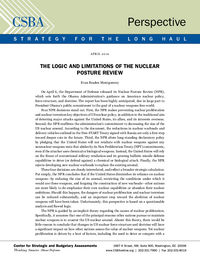
On April 6, the Department of Defense released its Nuclear Posture Review (NPR), which sets forth the Obama Administration’s guidance on American nuclear policy, force structure, and doctrine. The report has been highly anticipated, due in large part to President Obama’s public commitment to the goal of a nuclear weapons-free world.
Four NPR decisions stand out. First, the NPR makes preventing nuclear proliferation and nuclear terrorism key objectives of US nuclear policy, in addition to the traditional aim of deterring major attacks against the United States, its allies, and its interests overseas. Second, the NPR reaffirms the administration’s commitment to decreasing the size of the US nuclear arsenal. According to the document, the reductions in nuclear warheads and delivery vehicles outlined in the New START Treaty signed with Russia are only a first step toward deeper cuts in the future. Third, the NPR alters long-standing declaratory policy by pledging that the United States will not retaliate with nuclear weapons against any nonnuclear weapons state that abides by its Non Proliferation Treaty (NPT) commitments, even if the attacker uses chemical or biological weapons. Instead, the United States will rely on the threat of conventional military retaliation and its growing ballistic missile defense capabilities to deter (or defend against) a chemical or biological attack. Finally, the NPR rejects developing new nuclear warheads to replace the existing arsenal.
These four decisions are closely interrelated, and reflect a broader strategic calculation. Put simply, the NPR concludes that if the United States diminishes its reliance on nuclear weapons—by reducing the size of its arsenal, restricting the conditions under which it would use these weapons, and forgoing the construction of new warheads—other nations are more likely to de-emphasize their own nuclear capabilities or abandon their nuclear ambitions. Should this happen, the dangers of nuclear proliferation and nuclear terrorism can be reduced substantially, and an important step toward the abolition of nuclear weapons will have been taken. Unfortunately, this perspective is based on a questionable analysis and flawed logic.
The NPR is guided by an implicit theory regarding the causes of nuclear proliferation. Specifically, it assumes that one of the principal reasons other nations pursue or maintain nuclear weapons is to counter the US nuclear arsenal. Absent this theory, there would be little reason to conclude that changes in US nuclear force structure and doctrine will have a significant impact on how other nations assess the value of nuclear weapons. Yet nuclear proliferation is driven by a host of factors, including the need to deter or compete with a regional adversary, a desire to gain the domestic or international prestige that comes with mastering nuclear technology and acquiring the ultimate weapon, and efforts by various groups within a nation’s military or scientific community to secure greater influence and increased funding. Although the causes of proliferation in any specific case are often opaque, countering the US nuclear arsenal is only one of many possible motives, and there is no compelling reason to believe it is among the most important. At best, then, the NPR only addresses one piece of a multifaceted and complex problem.
A different but more accurate interpretation suggests that the NPR’s analysis may be misplaced entirely. To the extent that other nations do have the United States in mind when they pursue nuclear weapons, deterring a conventional military attack is almost certainly their principal goal. The United States has not employed nuclear weapons in a conflict since 1945, has not tested a nuclear weapon since 1992, and has rarely threatened to use nuclear weapons outside of the Cold War US-Soviet competition. By contrast, over the last two decades the United States has conducted major military operations against Panama, Serbia, Afghanistan and Iraq, several of which deposed the ruling regime. While the threat of a nuclear attack by the United States is extraordinarily small except in the most extreme circumstances, the possibility of conventional military attack against an enemy is very real. That is, of course, unless that opponent has nuclear weapons. For example, the United States has been unwilling to use military force against a nuclear-armed North Korea despite repeated provocations. The lesson—that nuclear weapons deter American conventional military power—is not a new one. As an Indian general officer reportedly observed following Iraq’s swift defeat during the First Gulf War, “Don’t fight with the United States without a nuclear weapon.”
Because the NPR draws questionable conclusions regarding the causes of nuclear proliferation, the remedies that it advocates are based on flawed logic and may not in fact support the administration’s objectives. Specifically, if nations pursue nuclear weapons to deter a conventional military attack by the United States, then diminishing their incentives to acquire or maintain these weapons would actually require limiting America’s conventional military power, not its nuclear capabilities. Instead, the NPR’s decision to increasingly rely on the threat of conventional military retaliation rather than nuclear deterrence simply obliges the United States to emphasize the very capabilities that seem to motivate proliferation in the first place.
Ultimately, there are a number of very good reasons for substituting conventional military power for nuclear threats, including enhanced credibility and, thanks to the advent of precision-guided weapons, a comparable level of effectiveness with far less collateral damage in many circumstances. Nevertheless, the expectation that these steps will slow or reverse nuclear proliferation and diminish the threat of nuclear terrorism is misguided at best, and potentially self-defeating at worst.



























